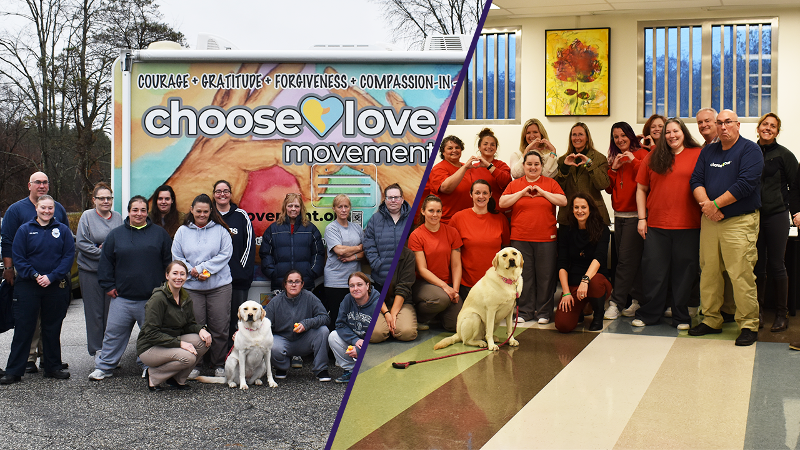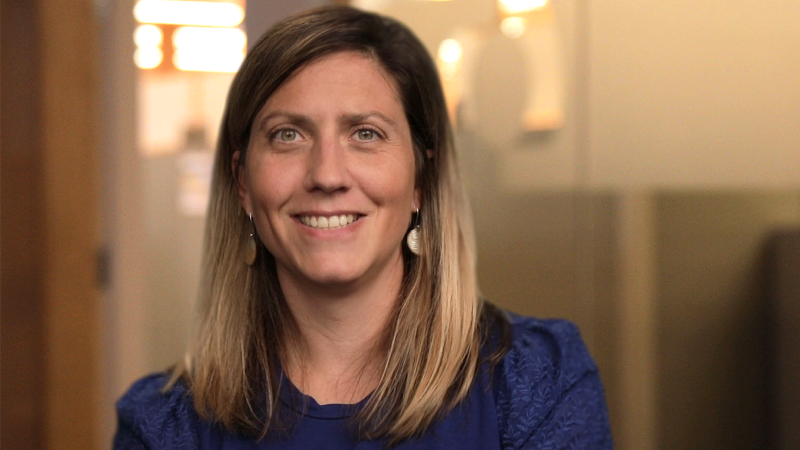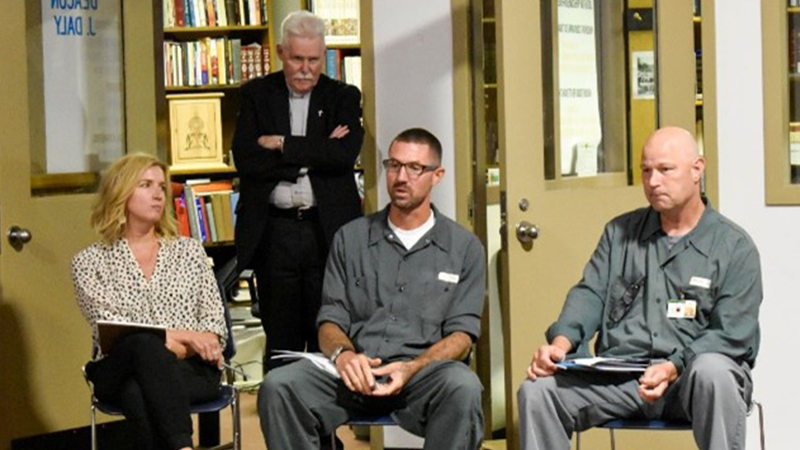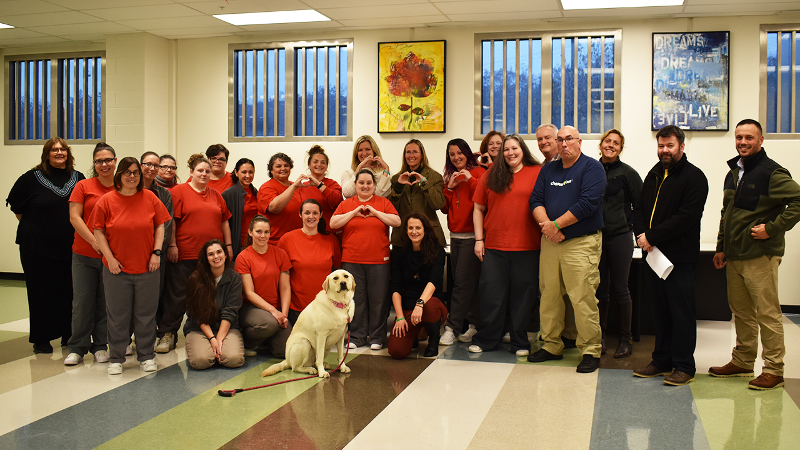CAST Partners with New Hampshire Prisons to Apply UDL to “Choose Love” Curriculum

In the face of unimaginable tragedy — losing her 6-year-old son in the Sandy Hook school shooting — Scarlett Lewis chose love.
Inspired by her son’s final acts of love, she created the Jesse Lewis Choose Love Movement, a social emotional learning and character development program, to teach people how to manage their emotions, feel connected, and foster healthy relationships.
Since its inception, the program has reached 10,000+ schools, and recently made its way into New Hampshire prisons with the help of CAST.
UDL Adapts Curriculum for Diverse Learners
Nicholas Duffy, Director of Rehabilitation Services for the New Hampshire Department of Corrections, knew the value Choose Love could bring to those incarcerated in New Hampshire’s prison facilities, but needed help adjusting the curriculum to be flexible and barrier-free for adult learners with diverse backgrounds, skills, and educational experiences. After working with CAST on other projects, Duffy says his request was met with enthusiasm.
Using the Universal Design for Learning (UDL) framework, the CAST team redesigned the Choose Love activities, discussions, and assessments to account for variability of the learning environments and learners within the New Hampshire Department of Corrections.

Dr. Amanda Bastoni, CAST Research Scientist & Project Lead
“The version we had was designed for use in schools,” says CAST Research Scientist and Project Lead Amanda Bastoni, Ed.D. “It was designed for kids, and it relied heavily on videos that people who are incarcerated can’t access. The curriculum needed to be tweaked and adjusted to be effectively used in the correctional environment.”
The CAST team applied UDL to increase the program’s accessibility.
“Many people who are incarcerated have not had a great experience in the educational world,” Bastoni says. “And many of them, statistically speaking, have some learning differences or learning disabilities that haven't been identified. We thought if we could use the UDL strategies, we could make the curriculum that much more accessible.”
Duffy discussed the program with the prisons’ communication committee, a group of incarcerated individuals who provide feedback about what improvements or programming they’d like to see in the correctional facilities.
“They were really enthusiastic about it,” Duffy says. “They did a little bit of their own research as well, and we were getting requests all the time regarding when the program would launch. It’s a great sign when residents are excited about the programming.”
As a UDL principle, the Choose Love curriculum allows participants to respond in multiple ways to match their unique learning styles. Program participants were given journals to write, draw, or express themselves in response to prompts however they saw fit.
“One woman made collages from cut-out magazines for her responses,” Bastoni says. “Some of the feedback we received from the women was that this was the first time they felt like they had some autonomy or ownership since becoming incarcerated.”
Peer-Led Programming Begins
In order to give the adult learners agency, CAST proposed running the program as a development circle, or support group.
“So, the people who are currently incarcerated would be facilitating and leading the group,” Bastoni says. “And that’s really revolutionary. You don’t find peer-to-peer programs run very often within correctional facilities.”

A Choose Love participant shares during a group conversation.
Volunteer facilitators received training, then met weekly in advance of the Choose Love sessions. Once someone goes through the program, they can become a facilitator for the next group. Staff from the Division of Rehabilitative Services are heavily involved in the organization and facilitation of the program, supporting the residents throughout each step of the program
Duffy stressed the importance of those trainings to set parameters and avoid power imbalances between inmates.
The program rolled out in the NH Correctional Facility for Women last fall as the first pilot.
“We spent a lot of time with participants saying, ‘This has never been done anywhere. Please give us your feedback,’” Bastoni says. “And then throughout the program, we built in reflections for them to provide feedback. We met afterwards and changed quite a bit based on what the women suggested.”
Changes included:
- Participants noted COVID-19 didn’t create very many changes in their day-to-day lives as they are incarcerated, so several pandemic references were removed.
- Scarlett Lewis’ experience was introduced earlier in the curriculum.
- To accommodate for people who may be released into transitional housing or the community, CAST implemented changes to allow participants to finish the program on their own.
- With participant input, CAST created a Choose Love playlist to incorporate more music into the curriculum.
‘Choose Love’ Builds Positive Family Connections
Since the Choose Love curriculum is taught in New Hampshire schools, the program created a link between parents and their children.
“A lot of the women expressed that they liked doing this because they could talk to their children about what they were learning,” Bastoni says. “Now they have this shared experience.”
This ties in with NH Department of Corrections Family Connections Center (FCC) a family support program for the New Hampshire Department of Corrections with a mission “to strengthen the connection between incarcerated parents and their families while facilitating ties to their community through education and support.”
“People often don’t take into consideration the impact someone’s crime has on their family,” Duffy says. “A parent is removed from their children.”
The FCC program offers monitored video visits between parents who are incarcerated and their children. Staff coach and provide skills on healthy communication and suggest conversation topics and fun activities.
“With a parent learning the same types of skills and the language to discuss those skills, they can reinforce what their kids are learning in school,” Duffy says. “And when they get released, the skills and knowledge they learned in the choose love program is going to help that family.”
New Hampshire Department of Corrections Continues to ‘Choose Love’
After implementing changes from the pilot launch, Choose Love moved into the NH State Prison for Men in August 2022, with plans of offering it every semester.
“We’ve sort of skipped over teaching social emotional learning as a society,” Duffy says. “We assume people have these skills, however I have sat in on the Choose Love Trainings and have learned from it every time. Participants learn growth mindset and how their body reacts to different situations, how to apologize, how to forgive. Learning these skills is extremely important.”

Choose Love participants pose for a group photo.
Participants also received Lewis’ book, “Nurturing, Healing, Love: A Mother’s Journey of Hope and Forgiveness,” and Lewis has visited and spoken at each of the facilities.
“Scarlett talks about the man who killed her son as a victim,” Bastoni says. “She says she had to forgive him. A lot of the women who read her book said, ‘For the first time, I felt like I wasn’t a monster. I felt like I could really relate because she gave so much forgiveness to him and saw him as a victim as well.’ The curriculum is powerful, meaningful, and wonderful.”
Duffy agrees the visits were well received.
“Hearing Scarlett say she forgives him is impactful for people who are struggling with their own crimes,” he says. “She has such enthusiasm for her program and how the program can create significant change in people’s lives”
The program continues to run in the women’s correctional facility, with newly trained facilitators. One of the last modules in the curriculum discusses how to carry the skills forward, which prompted the creation of a makerspace in the women’s facility to help the residents explore meaningful career ideas.
The program will soon be offered in New Hampshire Transitional Housing and the Northern NH Correctional Facility in Berlin, New Hampshire, and all of the learning modules will be freely available on the Choose Love website.
“I have really loved being a conduit for the people who are incarcerated to share and design a meaningful curriculum they can use for themselves,” Bastoni says. “Every time I’ve interacted with the Choose Love curriculum or the design of this project, I just felt very hopeful.”
Bastoni gives a lot of credit to Duffy, who worked hard to implement Choose Love.
“Scarlett created a wonderful curriculum,” she says. “Shannon [Desilets, Program Director of the Choose Love Movement for the State of New Hampshire] has worked really hard to spread the message in the state. I’m glad we’re using UDL strategies, but it wouldn’t happen without someone like Nick, who has such a creative and willing commitment to bringing good programming to people.”
Duffy hopes the program continues to grow.
“It’s not easy to implement quality programming in a prison setting, however it’s a credit to such talented partners like Amanda, ensuring the program is specifically designed with the incarcerated population in mind and our NHDOC staff who have shown such dedication and commitment to take the information from the trainings and implement the program so effectively. It’s been a great project that is going to have a profound impact on the participants and how we facilititate programming,” he says. “I’m grateful we were able to partner with such talented people to help us launch it.
Interested in partnering with us?
Our work depends on people like you. We partner with companies, institutions, and organizations to develop and improve resources to ensure the promise of accessible, inclusive, rigorous, and dynamic lifelong learning.